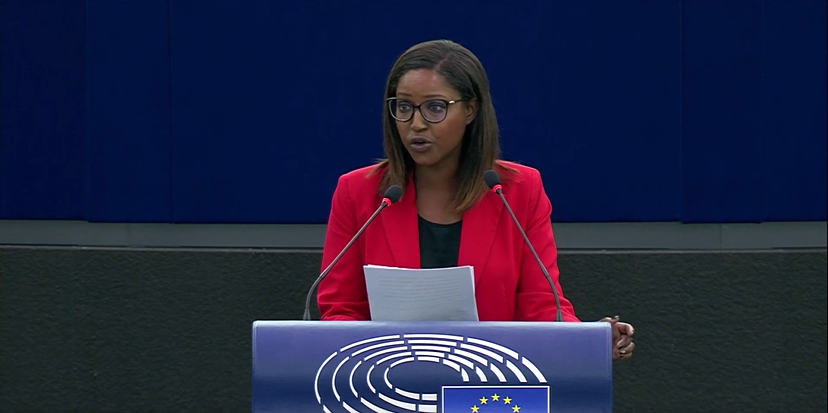This is the eighth of a series of interviews with Members of the European Parliament (MEPs). In this interview, we spoke with MEP Monica Semedo about her priorities as co-chair of the Disability Intergroup, the situation of workers with disabilities in the European Union (EU), and how the EU can support accessible culture and inclusive education. We also spoke about the Quality Traineeships initiative report and how it can protect trainees with disabilities.
Advocating for inclusion and accessibility
Question: Which are the priorities you want to work for as co-chair of the European Parliament Disability Intergroup?
Answer: Over a year ago, my doctor diagnosed me with a disability; I have a rare disease that affects my ability to see and I am only able to use 25% of my sight, even with glasses. I am lucky enough to work in a structure that, despite some administrative procedures, offers me tools and practices to simplify my work and allow me to fulfil my function in the Parliament.
However, many citizens are not so lucky. People with disabilities are the victims of a society that has left them behind for too long. As co-chair of the European Parliament Disability Intergroup, my job will be to represent them and be their voice at the European level. I will advocate for people with disabilities who, like me, are facing barriers that hinder them from living their lives as European citizens. My priorities will be to work for equal chances and opportunities and promote inclusion and accessibility for all people with disabilities.
Protecting workers with disabilities
Question: You have been involved in the negotiations of the Minimum Wage Directive. How this legislation will protect workers with disabilities, including those in sheltered employment?
Answer: Workers with disabilities have a higher probability of being minimum wage or low wage earners than other groups. Currently, it is even the case that in a number of Member States, workers with disabilities earn less than minimum wage.
This Directive applies to all workers including persons with disabilities and aims to protect especially persons with disabilities and from other disadvantaged groups.
Specifically, the legislation states that the principle of the United Nations’ Convention on the Rights of Persons with Disabilities which requires that workers with disabilities, including those in sheltered employment, receive equal remuneration for work of equal value “is relevant with regard to minimum wage protection”
The directive also provides that information about minimum wage shall be easily accessible to persons with disabilities. It also requires member states to provide disaggregated data by, among other categories, disability.
Supporting accessible culture and inclusive education
Question: You are a member of the Culture and Education Committee (CULT). What can the EU do to support accessible culture and inclusive education?
Answer: Culture and education are fields in which the EU, unfortunately, has very limited competencies. Still, some things can be done by way of recommendations. In the CULT Committee of the European Parliament, my group and I are always attentive to push for inclusive and intersectional approaches in all reports and resolutions. For instance, this was the case when I wrote the report on the situation of artists and the cultural recovery in the EU.
One specific thing that the EU can do is to include specific provisions in favour accessibility and inclusion in its funding programmes such as Creative Europe or Erasmus+.

Promoting inclusive and accessible quality traineeships
Question: You are the rapporteur for the Quality Traineeships initiative report. How will this initiative protect trainees with disabilities?
Answer: 2023 will be the European Year of Skills and as a member of the employment and social affairs (EMPL) Committee, I am in charge of drafting a report on Quality Traineeships. The European Commission will then translate this initiative into a legislative proposal. This report will promote quality traineeships to ensure good working conditions, useful learning experience, and remuneration for all trainees.
Besides, the report will underline that quality traineeships must be inclusive and accessible to all, urging in particular the need to support persons with disabilities. The initiative shall:
- Ensure an inclusive recruitment process
- Call for an EU wide definition of disability and an expansion of the European disability card to facilitate mobility of persons with disabilities
- Urge the need for an accessible workplace and reasonable accommodation for trainees with disabilities
- Highlight the need of unbundling remuneration and disability support to allow for extra disability related costs also for traineeships